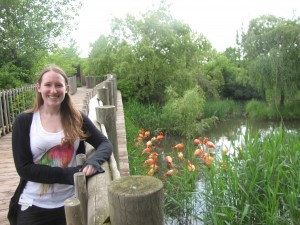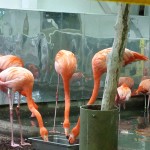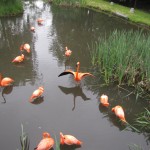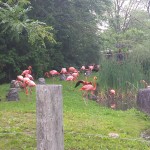 Caitlin Finlay
Caitlin Finlay
MSc. Student
Contact Information
Department of Biology
Concordia University (Loyola Campus)
7141 Sherbrooke St. W. H4B 1R6
Montreal, QC, Canada
Office: SP301.16
Lab: SP434
(514) 848-2424 (ext. 4021)
Education
2015-Present: MSc. Biology at Concordia University, Montreal, QC
2011-2014: BSc. Environmental Biology, specializing in Wildlife Biology at McGill University, Montreal, QC
My Project
The social and environmental impacts on breeding success in captive flamingos (Phoenicopterus ruber)
Background
Concordia University and Granby Zoo began a research collaboration in 2014 entitled “The Concordia-Zoo de Granby Initiative in Ecology, Conservation and Welfare of Captive Wildlife”. The aim of this collaboration is to increase knowledge on the role of zoos in conservation, and improve animal welfare practices.
Breeding flamingos in captivity can be challenging as flamingos have unreliable reproductive cycles dependent on environmental cues such as food availability, rainfall, and temperature. While zoos can control these factors to encourage breeding, it has not always been successful. Flamingos perform group ritual displays prior to the breeding season in order to synchronize reproduction. Current zoo exhibits tend to be open-topped enclosures which require the flamingos to be wing-clipped to restrict flight. Wing-clipping has been shown to decrease fertility in flamingos, and wing-clipped males often have difficulty maintaining their balance during copulations. Egg breakage is the most common cause of low reproductive success in captive flamingos. Nest site aggression is often the main cause of egg breakage and more research is needed to determine the causes of nest aggression and methods to decrease the aggression. Research on wild populations has shown that flamingos are active and often forage at night. Nocturnal activity has not been studied in captivity thus far and could alter the feeding protocols if it is found that they are more active at night. These various social and environmental factors will be studied in an attempt to better understand the breeding cycle of captive Caribbean flamingos and provide Granby Zoo with the information to improve the welfare of the flamingos, and create a more stable and successful breeding program.
Field Work
This research will be conducted at the indoor and outdoor Caribbean flamingo habitats in Granby Zoo in South-Eastern Quebec. Granby Zoo was founded in 1953 and is accredited by The Association of Zoos and Aquariums (AZA), the Canadian Association of Zoos and Aquariums (CAZA) and the World Association of Zoos and Aquariums (WAZA). Data collection will take place during summer 2015, winter 2016,and summer 2016. Individual flamingos can be identified using leg bands with unique numbers and color combinations.Through the identification of each individual, information from zoo records can be obtained to determine age, sex, and history of the individuals.
Objectives
In order to further the understanding of the Caribbean flamingo breeding cycle in captivity, we will:
- Study nest site aggression and its effects on captive breeding success.
- Determine the impacts of wing clipping on age and captive breeding success of Caribbean flamingos at Granby Zoo.
- Compare the protocols and reproductive timelines of various zoos with reproductive success.
- Examine the impact of noise level at the flamingo habitat on their behaviour and space use.
- Study the nocturnal habits of flamingos.
- Compare captive and wild activity budgets to determine if behaviour is altered in captivity.
Publications
C.A. Finlay, Weladji RB & Paré, P (2015) The social and environmental impacts on breeding success in captive flamingos (Phoenicopterus ruber). 40e congrès annuel pour le Société Québecoise pour l’Étude Biologique du Comportement, 6-8 Novembre, 2015, Montreal, Quebec, Canada (poster presentation).


